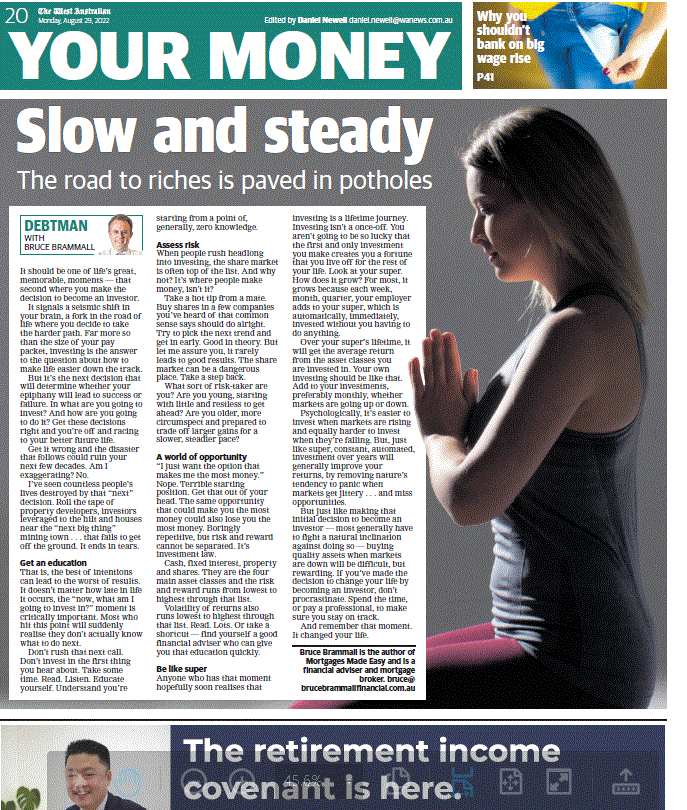
Bruce Brammall, The West Australian, 29 August, 2022
It should be one of life’s great, memorable, moments. That second where you make the decision to become an investor.
It signals a seismic shift in your brain, a fork in the road of life where you decide to take the harder path.
Far more so than the size of your pay packet, investing is the answer to the question about how to make life easier (down the track).
But it’s the next decision that will determine whether your epiphany will lead to success or failure.
In what are you going to invest? And how are you going to do it?
Get these decisions right and you’re off and racing to your better future life.
Get it wrong and the disaster that follows could ruin your next few decades. Am I exaggerating? No. I’ve seen countless people’s lives destroyed by that “next” decision. (Roll tape of property developers, investors leveraged to the hilt, and houses near the “Next Big Thing” mining town … that fails to get off the ground. Ends with tears.)
Get an education
That is, the best of intentions can lead to the worst of results.
It doesn’t matter how late in life it occurs, the “now, what am I going to invest in?” moment is critically important. Most who hit this point will suddenly realise they don’t actually know what to do next.
Don’t rush that next call. Don’t invest in the first thing you hear about.
Take some time. Read. Listen. Educate yourself. Understand you’re starting from a point of, generally, zero knowledge.
Assess risk
When people rush headlong into investing, the share market is often top of the list. And why not? It’s where people make money, isn’t it?
Take a hot tip from a mate? Buy shares in a few companies you’ve heard of that “common sense” says should do all right? Try to pick the next trend and get in early?
Good in theory. But let me assure you, it rarely leads to good results. The sharemarket can be a dangerous place.
Take a step back.
What sort of risk taker are you? Are you young, starting with little and restless to get ahead? Are you older, more circumspect and prepared to trade off larger gains for a slower, steadier pace?
A world of opportunity
“I just want the option that makes me the most money.”
Nope. Terrible starting position. Get that out of your head.
The same opportunity that could make you the most money, could also lose you the most money. Boringly repetitive, but risk and reward cannot be separated.
It’s investment law.
Cash, fixed interest, property and shares. They are the four main asset classes and the risk and reward runs from lowest to highest through that list.
Volatility of returns also runs lowest to highest through that list.
Read. Lots. (Or take a shortcut – find yourself a good financial adviser who can give you that education quickly.)
Be like super
Anyone who has that moment hopefully soon realises that investing is a lifetime journey.
Investing isn’t a once-off. You aren’t going to be so lucky that the first and only investment you make creates you a fortune that you live off for the rest of your life.
Look at your super. How does it grow?
For most, it grows because each week, month, quarter, your employer adds to your super, which is automatically, immediately, invested without you having to do anything.
Over your super’s lifetime, it will get the average return from the asset classes you are invested in.
Your own investing should be like that. Add to your investments, preferably monthly, whether markets are going up or down.
Psychologically, it’s easier to invest when markets are rising and equally harder to invest when they’re falling. But, just like super, constant, automated, investment over years will generally improve your returns, by removing nature’s tendency to panic when markets get jittery … and miss opportunities.
But just like making that initial decision to become an investor – most generally have to fight a natural inclination against doing so – buying quality assets when markets are down will be difficult, but rewarding.
If you’ve made the decision to change your life by becoming an investor, don’t procrastinate. Spend the time, or pay a professional, to make sure you stay on track.
And remember that moment. It changed your life.
Bruce Brammall is the author of Mortgages Made Easy and is both a financial adviser and mortgage broker. E: bruce@brucebrammallfinancial.com.au.